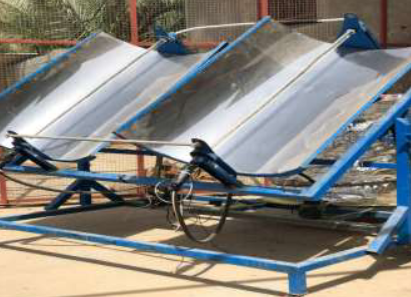Low Carbon Energy Tracking
Electricity is essential on the primary campus of Al-Mustaqbal University, serving various
purposes such as lighting, cooling, heating, and powering laboratory equipment.
The following is:
the total electricity usage of AL- Mustaqbal University between 2020 and 2023:
∎ In 2020, the total electricity usage of AL- Mustaqbal University is about 123,134 kWh.
∎ In 2021, the total electricity usage of AL- Mustaqbal University is about 205,350.91 kWh.
∎ In 2022, the total electricity usage of AL- Mustaqbal University is about 277,916 kWh.
∎ Till September 2023, the total electricity usage of AL- Mustaqbal University is about 347,395
kWh .
Complete Read
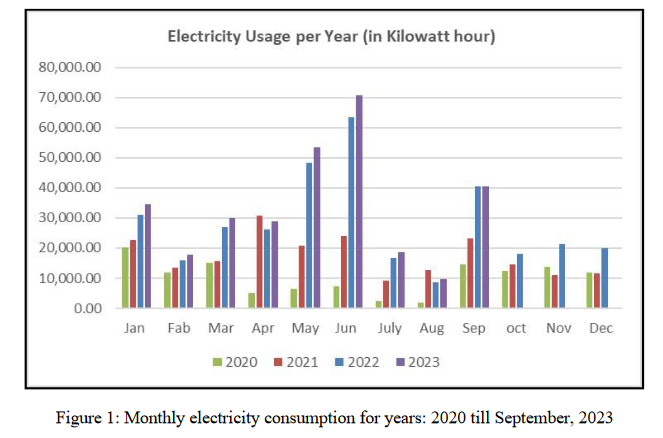

Local Education Programmes on Climate
Al-Mustaqbal University organized an educational campaign with the aim of preserving
the environment in tourist resorts.
The university's efforts were aligned with the pursuit of sustainable development goals,
specifically the eleventh goal related to sustainable cities and communities.
The
university organized a volunteer campaign in the historic Babylon resort to clean the
gardens and conducted an educational campaign to promote environmental cleanliness
by distributing informative brochures to the citizens and raising cultural awareness
among them.
The campaign witnessed a significant response from citizens who carefully listened to
the advice provided to them, and many of them participated in the campaign
Complete Read
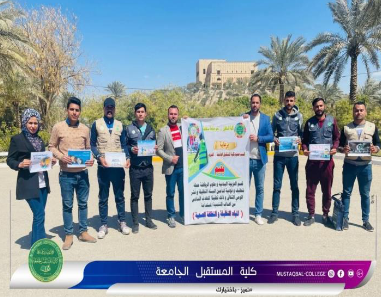
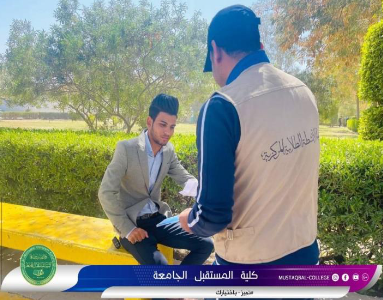
Climate Action Plan, Shared
Climate change is considering one of the biggest problems that affect our
environment in addition it reduces the productivity of the persons which make it a threat
to the economy of the country. So, if there is no serious solution for the climate change,
it may be push 100 million people into the poverty by 2030.
There are some goals that
the university seeks to achieve during the coming period:
1. Preparation to include programs in energy conversion and management in
educational institutions, universities, and boards in the syllabus.
2. Organization of training of academic staffs and experts in the field of energy and
buildings construction for bettering utilization of sustainable energy in buildings.
3. Encouragement of scientific research and progress in the field of energy and buildings.
4. Support the construction of the sustainable buildings through consultants
5. Promotion of innovative funding of energy efficiency, transition and consumption
projects
6. Using energy efficient of equipment, processes, systems, and devices such as LED
lighting, renewable energy, solar powered air conditioning.
Complete Read
Co-operative Planning for Climate Change Disasters
Since its establishment, the university has actively engaged in numerous meetings with the local
government in order to put efficacious planning for improving the present condition of Iraq
climate. In recent years, many climate-related issues have arisen, prompting the university to
take rapid steps towards mitigating the effects of climate change. Some of the most important
initiatives in this regard include:
1. Under the patronage of Mr. Presendent of the Al-Mustaqbal University, Professor Dr.
Hassan Shaker, and in alignment with the university’s policy ("Towards a Sustainable
University"), the First Scientific Symposium was held under the title "Water
Sustainability and Climate Change" at 9:30 AM. The symposium featured three
substantial scientific sessions:
• The First Session: "Climate Change in Light of the Outcomes of the Glasgow
Conference," presented by Professor Dr. Ali Abdul Zahra Al-Lami, an expert and
consultant for environmental and climate affairs at the Prime Minister's Advisors
Office.
• The Second Session: "Preventive Water Policy," presented by Professor Dr.
Mohamed Sabri Ibrahim, a senior political advisor at the Ministry of Water
Resources.
• The Third Session: "Towards a Hydrological Approach to Iraqi Water Security (A
Study of the Middle and Lower Euphrates Basin)," presented by Professor Dr.
Kazem Musa Mohammed Al-Taie, former Dean of the College of Basic
Education at the University of Mosul
Complete Read
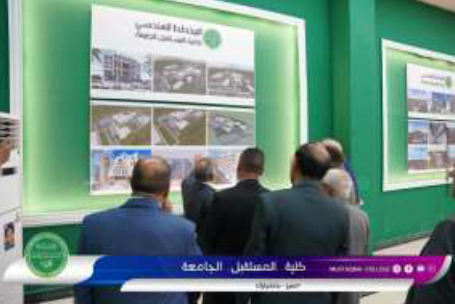
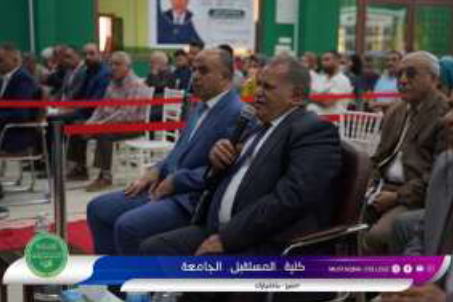
Inform & Support Government
Climate Change Challenges… Studies discussed by representatives of Al-Mustaqbal University with the
Director-General of Climate Change at the Ministry of Environment.
As part of Al-Mustaqbal University's efforts to achieve sustainable development goals, especially in
addressing the climate challenges facing the region.
A delegation from Al-Mustaqbal University, consisting of the consultant at the office of the university
president and the coordinator of cultural relations at the office of the university president, met with the
Director of the Climate Change Directorate on the morning of Monday, August 28, 2023. They discussed
the draft of a joint scientific cooperation agreement between the two parties to discuss proposed
amendments to the agreement and the inclusion of climate change topics in its provisions.
The coordinator of cultural relations explained the university's activities and its pursuit of sustainable
development goals. The university has established a Sustainable Development Unit and is currently
preparing for the second international conference on the future of sustainable energy in mid-March.
The consultant at the office of the university president presented several documents regarding previous
correspondences leading to the signing of this agreement. Al-Mustaqbal University is keen to open
avenues of joint scientific cooperation with the Ministry of Environment and its various departments. The
university has organized numerous activities in the fields of environment and energy and has provided
support to the National Energy and Water Initiative. In recognition of these efforts, the Technical
Undersecretary of the Ministry of Environment and the initiative's president sent letters of thanks and
appreciation dated March 22, 2023, addressed to the university president and the consultant at the office
of the university president.
Complete Read
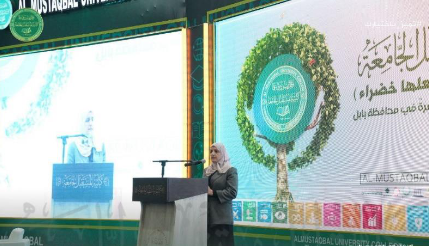
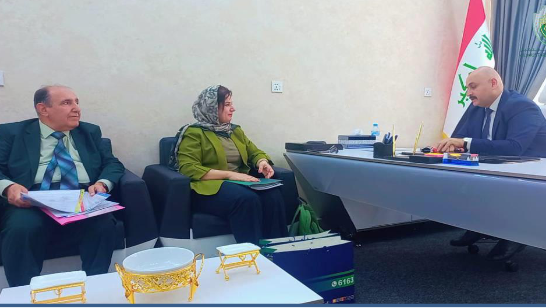
Environmental Education Collaborate with NGO
Praise of Al-Mustaqbal University's events by the United Nations.
On October 18, 2022, in Babil, under the auspices of the Ministry of Agriculture, World Food Day was
celebrated in collaboration with the FAO Iraq organization at Al-Mustaqbal University in Babil Province
as part of the Future Agriculture Forum for Sustainable Agriculture, under the theme "Sustainable Rural
Development: Agriculture as the Path to Achieving Food Security and Poverty Eradication," in the
presence of the Deputy Minister of Agriculture, the President of Al-Mustaqbal University, And the Food
and Agriculture Organization (FAO) and the FAO representative in Iraq.
The event was attended by various agricultural production companies, farmers, the local community, and
representatives from academic and government sectors. They discussed the state of food security in Iraq
and the world and visited an exhibition of locally produced agricultural products within the university.
The FAO representative in Iraq highlighted the importance of World Food Day and the major challenges
in overcoming food insecurity for everyone. He mentioned, "From 2008 to 2018, globally, agriculture,
including crops, livestock, forests, fisheries, and aquaculture, accounted for 26% of the overall impact of
medium to large-scale disasters, with Iraq being one of the most affected countries." He also emphasized
that "high salinity and drought pose a serious threat to the Iraqi ecosystem, especially the marshes. The
land between the two rivers, the cradle of human civilization where farmers have relied on hunting water
buffalo and raising them in fertile wetlands for thousands of years, is at risk due to water scarcity and
declining water quality. We need to work together to address these challenges.
Complete Read
Commitment to Carbon Neutral University
Climate change presents growing challenges for energy, water resources, and supply. To address
these challenges, Al-Mustaqbal University has established a policy that mandates both staff and
students to actively participate in efforts to conserve electricity and water. Al-Mustaqbal
University approaches water conservation from four interconnected and efficient dimensions,
while promoting responsible electricity consumption.
o 1. Energy Efficiency: Policies should encourage the use of energy-efficient building
materials, designs, and technologies to reduce energy consumption during both
construction and operation phases.
o 2. Sustainable Materials: Promote the use of sustainable and eco-friendly building
materials that have a lower environmental impact, such as recycled materials and
renewable resources.
o 3. Water Conservation: Policies can include requirements for water-efficient fixtures,
rainwater harvesting, and landscaping that reduces water usage.
o 4. Waste Reduction: Encourage construction practices that minimize waste generation
and promote recycling and reuse of construction materials.
o 5. Indoor Air Quality: Ensure that buildings provide a healthy indoor environment with
proper ventilation, low-VOC (volatile organic compounds) materials, and pollutant
control measures.
o 6. Site Selection: Promote responsible site selection that minimizes environmental
disruption and preserves natural habitats.
Complete Read

